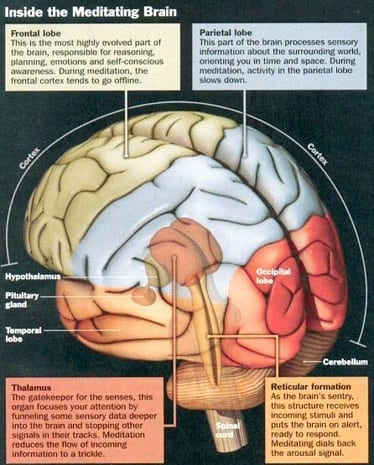Why We Should Make Meditation A Part of Our Lives
Blue indicates link
Definition of meditation:
The practice where an individual uses a technique – such as mindfulness or focusing their mind on a particular object, thought, or activity, training their attention and awareness, to achieve a mentally clear and emotionally calm and stable state.

The earliest written records of meditation (Dhyana), came from the Hindu traditions of Vedantism around 1500 BCE. Meditation has been practiced since antiquity in numerous religious traditions and beliefs, often as part of the path toward enlightenment and self-realization. Since the 19th century, it has spread from its origins to other cultures where it is commonly practiced in private and business life.
Meditation may be used with the aim of reducing stress, anxiety, depression, and pain, and increasing peace, perception, self-concept, and well-being. Meditation is under research to define its possible health (psychological, neurological, and cardiovascular) and other effects.
12 Science-Based Benefits of Meditation:
Reduces Stress:
Stress reduction is one of the most common reasons people try meditation.
Controls Anxiety. Less stress translates to less anxiety.
Promotes Emotional Health. 
Lengthens Attention Span.
May Reduce Age-Related Memory Loss.
Can Generate Kindness.
Enhances Self-Awareness.
May Help Fight Addictions.
The Four Must-Knows About Meditation:
It Increases Gray Matter:
Brain Scans of participants in a meditation study at Yale, Harvard, and Mass General Hospital showed increases in gray matter in parts of the brain, and that meditation may slow natural brain deterioration.
The Parts of the brain with increased gray matter thickness are related to processing and sensory input
It Improves Brain Plasticity:
There are some words that are just medical terms. To get a better understanding of these terms please refer to the illustration of where these terms may assist you. Thank you.
A study of meditation practitioners showed an increase in the number of neurons in the part of the brain’s hippocampus, (related to learning and memory) and a reduction in the volume of the amygdala, (related to anxiety and stress) after just eight weeks.
Similar studies have shown increases in the number of nerve connections in the front cortex, which is responsible for concentration. The right insular is responsible for emotions, and the right parietal and temporal lobes are responsible for touch and sound.

It Helps You Sleep More Efficiently:
Meditation has been shown in many studies to improve sleep and enhance various markers known to play a role in sleep quality and duration. For instance, people who meditate were shown to have elevated levels of melatonin, which is a hormone that regulates sleep. Also, meditation contributes to certain brain wave states and impacts the nervous system in such a way that aids sleep.
Separate research has found that meditation may be an effective behavioral intervention in the treatment of insomnia
It Lowers Blood Pressure:
Transcendental meditation (a type of meditation that involves silently repeating a word, sound, or phrase in order to stop distracting thoughts from entering the mind) may be effective for controlling blood pressure, according to a 2008 analysis of nine clinical trials. Investigators concluded that practicing transcendental meditation may have the potential to reduce systolic and diastolic blood pressure by approximately 4.7 and 3.2 mm Hg, respectively. (Systolic blood pressure is the top number in a blood pressure reading; diastolic blood pressure is the bottom number.)
Meditation promotes relaxation and therefore keeping your blood pressure in check. Blood pressure is a measurement of the force of blood against the walls of your arteries and can become elevated due to a number of factors (such as age-related narrowing of the arteries, underlying medical problems, and excessive sodium intake). By using meditation to manage your blood pressure, you may be able to boost your defense against heart disease, stroke, and chronic kidney disease.
Different Types of Meditation:
Zen Meditation
OM Meditation
Guided Meditation
Mindfulness Meditation
Raja Yoga Meditation
1. Zen Meditation:
Zen Meditation is an ancient meditation practice that originated in China 1500 years ago.
A king called Bodhidharma from South India went to China to spread Buddhism and devised a method called Zen meditation that helps a person to sit and detach from his thoughts and ideas calmly.
2. OM Meditation:
OM Meditation is a practice that involves chanting the word ‘OM’ to focus your mind. The sound of ‘OM’ reverberates through your body filling it with vigor and energy. In this meditation, you use breath and sound to relax and calm your mind.
3. Guided Meditation:
Guided meditation is relatively a newer method of meditation that is done with a guiding force to help you through the meditation. The guiding force could either be a teacher’s voice, soothing music, or imagining a happy moment or place.
4. Mindfulness Meditation:
Mindfulness Meditation is about becoming aware of what you are and the present moment. It is acknowledging reality and accepting thoughts as they occur. Mindfulness Meditation creates a space between your thoughts and your response to them.
5. Raja Yoga Meditation:
Raja Yoga meditation gained popularity through Swami Vivekananda, and its technique involves concentrating on a positive thought and spreading its effects throughout the body. It works well for mental stability and sanity.


Be comfortable when you are meditating
More on Meditation with Images at the following link
Your focus, memory, confidence, and other medical needs will soon be realized and there are NO side effects
Thank you for reading.
Michael
Comments are welcome

Hey, Michael thanks for sharing your website with us. I wonder if yoga would help reduce your blood sugar? I did yoga once when I was on vacation up in New York. In the future try to have me write feedback so we can receive credits. This website looks pretty good. I like the table of contents up ob the top of the page.
Michael, This website is great! Very informative and helpful. I will use it for reference in the future.